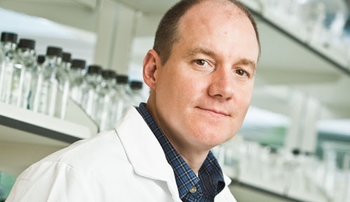Experts in Ebola — both physicians who treat patients and scientists who study the disease — will share their expertise at a one-day symposium Wednesday in Omaha.
Sponsored by the U.S. Strategic Command, University of Nebraska’s National Strategic Research Institute (NSRI) and UNMC, this one-day “Technical Interchange Meeting” will bring together infectious disease scientists from across the nation who can exchange ideas with physicians who have treated Ebola patients, said Ken Bayles, Ph.D., associate vice chancellor for basic science research at UNMC.
Experts on hand will include scientists from UNMC, the National Institutes of Health, the Defense Threat Reduction Agency, the U.S. Army Medical Research Institute for Infectious Diseases and others.
“Specifically, the focus will be on Ebola genomics and the study of the next generation of DNA sequencing technologies used to study the disease,” said Dr. Bayles, who is organizing the event. “This meeting is significant because not only will it have outstanding basic scientists, but it also will have physicians who are among the world’s leaders in treating this disease. I’m confident that we’ll learn a lot from each other’s experiences.”
The symposium will begin at 8 a.m. at the Embassy Suites Hotel, 555 S. 10th St. in Omaha.
The Technical Interchange Meeting (TIM) format is used often by the U.S. military in bringing together experts across various disciplines to discuss a specific topic. It also provides an opportunity for faculty experts to educate potential funding agencies, such as the Department of Defense, on their capabilities while learning of the agencies’ research needs.
Genomics refers to the study of genomes, or the complete set of DNA within a single cell of an organism. The field has grown quickly, as state-of-the-art DNA sequencers produce relatively rapid results, providing near endless areas for scientists to study.
“This is an area in which UNMC has demonstrated strength, and we are eager to become internationally recognized in the use of this cutting-edge sequencing technology,” said Bob Hinson, director of the NSRI and retired U.S. Air Force lieutenant general. “What we hope to make clear in this meeting is that the power of this technology is not limited to the study of Ebola – it can be applied to any disease.”
